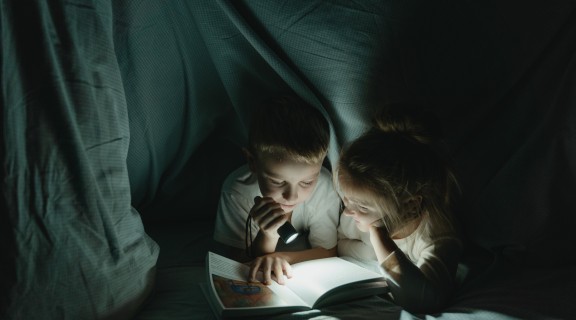
The language of sustainability
8 March 2022 | State Library of Queensland
Every year, hundreds of millions of people around the world in more than 7,000 cities in over 190 countries celebrate Earth Hour by switching the lights off for 60 minutes as a symbolic gesture of solidarity to show they care about our planet's future.
Educating and supporting children to become environmentally responsible is an important part of early childhood. It’s never too early to teach children to care about the environment. Share your love of nature with them by going on picnics, camping, spotting birds, and planting trees and flowers.
Help children learn about sustainability with these practical things you can do at home. Discuss what you’re doing and why you make these decisions.
“Let’s buy these apples and put them in our own bag and that way we won’t need a plastic bag". Ask children to record and display their ideas about living sustainably and support them to put their ideas into practice.
Here are some ways you can encourage children to care for the environment:
- Be water wise. Turn the tap off when brushing your teeth! Talk about the rainfall and the water cycle, from rain to water storage to usage.
- Create and label your recycling bins in the kitchen.
- Start a compost bin for food scraps. Talk about how food breaks down into soil you can use in the garden. Watch as the scraps change to soil.
- Have a worm farm and talk about how worms make a natural fertiliser.
- Collect your own seeds and grow them in empty milk cartons or other discarded containers. Talk about self-sufficiency and what it means.
- Encourage their belief that they can make a difference. “Wow you grew those tomatoes from seeds! Well done!”
- Use old junk mail as notepads, make your own paper or use empty cereal boxes for artwork.
- Collect material throughout the year to make your own wrapping paper and cards. Teach children to get excited and thoughtful about the possibilities.
- Save old buttons and bows for other clothes or artwork. Talk about how recycling and upcycling avoids waste.
- Walk or cycle whenever you can. Talk about how cycling is good for you and the planet. Point out flowers and listen to the bird songs on your way!
- Stay positive! Look for good news stories about local schools or businesses making a difference. Praise children when you notice them doing something that is good for the environment.
- Help build your child's confidence by giving them their own role in sustainability, such as collecting rainwater to water the garden or sorting recyclables for re-purpose. They’ll soon be enthusiastic about their task!
- Respond to your little one's questions and comments with simple honest answers. “We have to save water because we haven’t had as much rain as usual this year”. Be ready to follow-up your answers with more details if they ask for more.
Books help start the conversation
A great way to provide more information is by sharing books on the environment. Children’s brains are designed to absorb knowledge and learn new behaviours. Reading books about sustainability is a good way to start discussing a difficult topic.
Here are some books on an environmental theme:
- Australia's wild weird wonderful weather by Stephanie Owen Reeder
- Koalas eat gum leaves by Laura Bunting
- Old enough to save the planet by Loll Kirby
- One remarkable reef by Kellie Byrnes
- The ABC kids guide to loving the planet by Jaclyn Crupi
- The polar bear in Sydney Harbour by Beck Feiner
- The pout pout fish cleans up the ocean by Deborah Diesen
- The wonderful wisdom of ants by Philip Bunting
- What we’ll build by Oliver Jeffers
Your local public library may have some of these titles or ask library staff for other titles on this topic! Watch out for library activities that can help children develop good sustainability practices.
Comments
Your email address will not be published.
We welcome relevant, respectful comments.